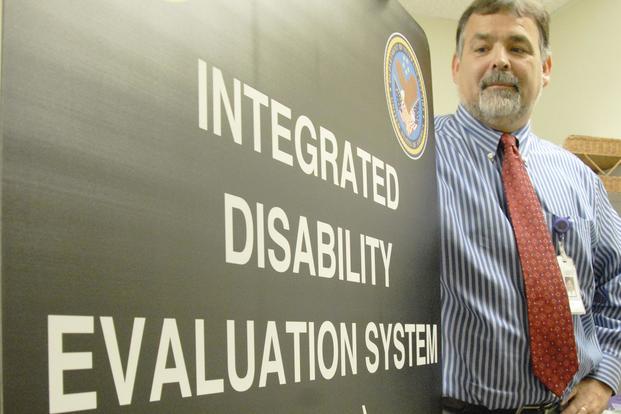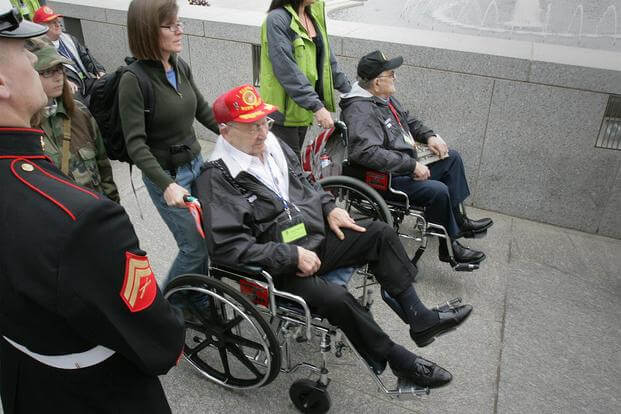Trump Signs VA Accountability Act...

Trump Signs VA Accountability Act, Gives Pen to Double-Amputee
23 Jun 2017 | President Trump signed the VA Accountability Act on Friday to give the VA more authority to fire poorly performing employees.

Trump Signs VA Accountability Act, Gives Pen to Double-Amputee
23 Jun 2017 | President Trump signed the VA Accountability Act on Friday to give the VA more authority to fire poorly performing employees.
Double-amputee 82nd Airborne Division Sgt. Michael Verardo was at the White House on Friday to attest to the urgent need to hold Veterans Affairs Department employees more accountable for delayed or poor treatment. With President Donald Trump and Veterans Affairs Secretary Dr. David Shulkin looking on, Verardo told an audience of lawmakers and representatives of veterans service organizations of his struggles with the VA system after stepping on an improvised explosive device in Afghanistan in 2010.
Verardo said he was prepared for the risks and injuries of combat, but "what I was not prepared for was coming home to a broken VA system. I wasn't prepared to wait 57 days for a signature on a piece of paper so that my prosthetic limb could be repaired." "I wasn't prepared to make a three-hour round trip so that just last year they could check to see if I still had my serious combat injuries. I wasn't prepared to watch my wife [Sarah] beg, plead and make countless phone calls so that I could receive what was often basic and necessary medical care." Verardo said he also had to wait three years for the VA to make the promised adaptations to his home in North Carolina to make it handicapped-accessible, "but today is a new day and this administration has fulfilled its promise -- that the veteran is empowered and the veteran is in charge of his or her own care." Shulkin, noting Verardo went through 111 surgeries in his recovery, said, "It's veterans like Michael who are the reason the VA exists. It was heartbreaking to me to hear his story. He had to jump through one bureaucratic hoop after another," but "I'm pleased to say he's waiting no longer."

President Trump gives the pen he signed the Department of Veterans Affairs Accountability and Whistleblower Protection Act of 2017 to Purple Heart recipient Michael Verardo during a ceremony in the East Room of the White House
Following his own remarks, Trump signed the Veterans Accountability and Whistleblower Protection Act, empowering Shulkin to bypass existing civil service rules at the VA in the hiring, firing and promotion of employees. Trump then handed the pen to Verardo. "In just a short time, we've already achieved transformative change at the VA -- and believe me, we're just getting started," the president said. "The enthusiasm for the Veterans Administration and for making it right for our great veterans has been incredible, and I want to thank all of them." "As you all know all too well, for many years the government failed to keep its promises to our veterans," Trump said. "We all remember the nightmare that veterans suffered during the VA scandals that were exposed a few years ago" at the Phoenix VA Medical Center. "Veterans were put on secret waitlists, given the wrong medication, given the bad treatments, and ignored in moments of crisis for them. Many veterans died waiting for a simple doctor's appointments. What happened was a national disgrace," he said. "And yet, some of the employees involved in these scandals remained on the payrolls. Outdated laws kept the government from holding those who failed our veterans accountable," Trump said. "Today, we are finally changing those laws -- wasn't easy, but we did have some fantastic help -- to make sure that the scandal of what we suffered so recently never, ever happens again."
The Accountability Act, he said, "gives the secretary the authority to remove federal employees who fail and endanger our veterans, and to do so quickly and effectively. It's been a long time since you've heard those words. Those entrusted with the sacred duty of serving our veterans will be held accountable for the care they provide." "At the same time, this bill protects whistleblowers who do the right thing. We want to reward, cherish, and promote the many dedicated employees at the VA," Trump said. The bill had the support of the veterans service organizations and the bipartisan support of lawmakers in the House and Senate. "This bill finally corrects the archaic and broken civil service system that has prevented the VA secretary from removing bad actors, and strengthens protections for whistleblowers who are committed to the health and well-being of veterans," Sen. John McCain, R-Ariz., said in a statement.
MORE























